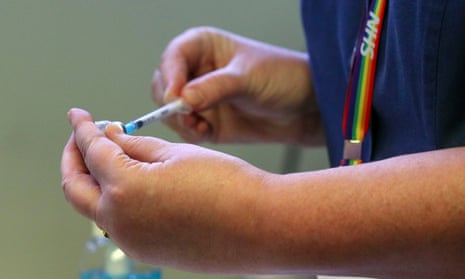The decision to lift England’s remaining Covid restrictions next Monday – even as cases of the Delta variant surge around the country – is expected to turbocharge the epidemic and push the nation into what one leading scientist called “uncharted territory” in terms of the numbers of people left suffering from long Covid.
Ministers have been told to expect at least one to two million coronavirus infections in the coming weeks. And while the mass rollout of vaccines – which started with elderly and vulnerable people – will dramatically reduce the proportion who are hospitalised and die, the wave may leave hundreds of thousands of younger people with long-term health problems, researchers have said.
Also known as post-Covid syndrome, long Covid describes more than a dozen symptoms that can endure for months after testing positive for the virus. Many patients experience debilitating fatigue, shortness of breath, chest pains, sleeping difficulties and problems with memory and concentration, often referred to as “brain fog”.
Danny Altmann, a professor of immunology at Imperial College, says evidence from multiple countries now suggests that a significant number of people who get Covid – whether they know they are infected or not – are at risk of developing longer-term illness.
“From every version of Covid we’ve ever seen on the planet, we’ve got a rule of thumb that any case of Covid, whether it’s asymptomatic, mild, severe, or hospitalised, incurs a 10 to 20% risk of developing long Covid, and we haven’t seen any exceptions to that,” he said.
Given that the health secretary, Sajid Javid, has warned that Covid infections may soon reach 100,000 per day, Altmann says it is reasonable to expect 10,000 or 20,000 of those daily cases to go on to develop long Covid. But there are huge uncertainties around long Covid, including why some are more at risk than others, how long symptoms endure for, and what treatments might help.
“It’s a nightmare for anyone to plan for accurately because it’s such a slippery thing to get hold of,” Altmann said. “We don’t understand where we’re headed because we’re in truly uncharted territory, but we know enough to know it looks fairly serious and fairly scary.”
No one really knows what causes long Covid. Many researchers suspect that it is a number of different conditions with a mix of underlying causes. Some ailments may be driven by cellular damage, such as lung scarring, that the virus causes when it infects the tissues. Another possibility is that the virus lingers on and forms small reservoirs, in the gut for example.
But evidence is mounting that a large proportion of long Covid is driven by the impact the virus has on immune defences. It appears to disturb parts of the immune system much as glandular fever does. And it can trigger the creation of rogue antibodies known as “autoantibodies” that fail to fight the virus and turn on the body instead.
Recent research from the UK’s multi-institution Convalescence study found that long Covid was significantly more common in middle age (17%) than in younger people (7.8%). But long Covid is far more severe in some than others: about 1.2% of 20-year-olds and 4.8% of middle-aged people interviewed for the study said their illness was serious enough to impact on their daily routine.
The study went on to find that women are 50% more likely to report symptoms than men, and people with asthma are 30% more likely to develop the condition than those with no history of the condition. All may have explanations in the workings of the immune system.
Dr Claire Steves, an epidemiologist and senior author on the Convalescence study at King’s College London, said the next six weeks or so would be particularly risky as England opens up, with so many young adults not yet fully vaccinated. But she says the vaccines offered hope for protecting people against long Covid as well as acute Covid. In work to be published later this week, Steves and her colleagues show that vaccination substantially reduces the risk of long Covid.
“We are seeing a very clear reduction in the risk of long Covid in all age groups if you have had two shots of vaccine,” she said. “We know the vaccines really work to reduce your risk of getting infected in the first place, and then if you are unlucky enough to get Covid we are showing your risk of long Covid is much reduced.”
For those already battling long Covid, Steves says people do generally improve over time. “Even in those individuals that are still symptomatic now, they are improving, they are doing better than three months ago and six months ago,” she said. “But there is this set of individuals that really do have very longstanding change in their ability to function.”
Ultimately scientists need to tease apart the biological markers for the disease and the mechanisms which turn a run-of-the-mill Covid infection into more debilitating long Covid. Armed with that information, researchers could create a test for the condition. “If you can understand the underlying mechanism, you could take all those millions of people on the planet who can’t even prove to anybody that they are ill – not to their employer, not to their GP, not to their health insurers or whatever – and you could give them a definitive, objective test and say yes you have that profile, you can go into the care pathway,” Altmann said.
Knowledge of the mechanisms could also lead scientists to preventive drugs that block the chain of events that cause long Covid. “In the end, in terms of personal impact, healthcare impact, societal impact, economic impact, it’s often not the viral infection that blows things apart, it’s the aftermath,” he added.
